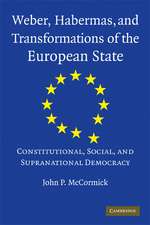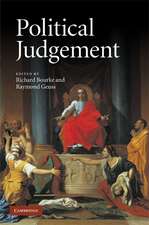Machiavellian Democracy
Autor John P. McCormicken Limba Engleză Paperback – 30 ian 2011
| Toate formatele și edițiile | Preț | Express |
|---|---|---|
| Paperback (1) | 158.77 lei 3-5 săpt. | |
| Cambridge University Press – 30 ian 2011 | 158.77 lei 3-5 săpt. | |
| Hardback (1) | 702.36 lei 6-8 săpt. | |
| Cambridge University Press – 30 ian 2011 | 702.36 lei 6-8 săpt. |
Preț: 158.77 lei
Nou
Puncte Express: 238
Preț estimativ în valută:
30.38€ • 31.72$ • 25.14£
30.38€ • 31.72$ • 25.14£
Carte disponibilă
Livrare economică 15-29 martie
Preluare comenzi: 021 569.72.76
Specificații
ISBN-13: 9780521530903
ISBN-10: 0521530903
Pagini: 266
Ilustrații: 1 table
Dimensiuni: 156 x 234 x 15 mm
Greutate: 0.36 kg
Editura: Cambridge University Press
Colecția Cambridge University Press
Locul publicării:New York, United States
ISBN-10: 0521530903
Pagini: 266
Ilustrații: 1 table
Dimensiuni: 156 x 234 x 15 mm
Greutate: 0.36 kg
Editura: Cambridge University Press
Colecția Cambridge University Press
Locul publicării:New York, United States
Cuprins
1. Introduction: class, liberty and popular government; Part I: 2. Peoples, patricians, and the prince; 3. Democratic republics and the oppressive appetite of young nobles; Part II: 4. The benefits and limits of popular participation and judgment; 5. Elections, lotteries and class specific institutions; 6. Political trials and 'the free way of life'; Part III: 7. Republicanism and democracy; 8. Post-electoral republics and the people's tribunate revived.
Recenzii
'John McCormick has … offered a bold and compelling reading of an under-appreciated democratic strain in Machiavelli's thinking by highlighting the elite-controlling and citizen-empowering aspects of democratic institutions within Machiavelli's major writings. The book is an excellent work of scholarship that is sensitive to the nuances of the tradition in which Machiavelli was writing and the settled assumptions he sought to overturn.' Theory and Event
Notă biografică
Descriere
Excavates institutions through which the common people of ancient, medieval and Renaissance republics constrained the power of wealthy citizens and public magistrates.













